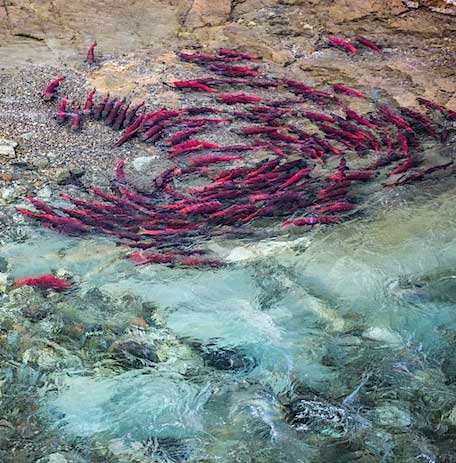

Pushing Back: Pebble Mine & the Alaska National Wildlife Refuge
This is a free, online event. Please register here.
American Indian tribes and Alaska Native communities have harnessed their unique status as governments to pull levers that have challenged and influenced federal decision-making around environmental regulation and industry. In the far north, the Gwich’in people have pushed back against oil drilling in an unprotected area of the Alaska National Wildlife Refuge (ANWR) for nearly four decades. Their goal? To protect the land and caribou on which their lives depend. For the 15 Indigenous communities in southeast Alaska who know the salmon, watersheds, and lands around Bristol Bay as their home, the United Tribes of Bristol Bay successfully knocked back the proposed Pebble Mine and protected the most productive salmon fishery in the world and their ways of life.
What toll did these decades-long fights have on these Indigenous communities? What was at stake? What mechanisms were the tribes able to use to help move the dialogue and shift outcomes? What does the future hold?
Note: This is the first of four events in the 2023 Indigenous Leadership Briefing series. More information about upcoming events will be available soon!
SPEAKERS
Alannah Hurley (Yup’ik)
Executive Director, United Tribes of Bristol Bay (UTBB)
Ms. Hurley has worked extensively in community development and is deeply committed to environmental justice. As the executive director of the UTBB, she leads a tribally-chartered coalition of 15 federally recognized tribes working to protect the Yup’ik, Dena’ina, and Alutiiq ways of life and the pristine Bristol Bay watershed and the life it sustains.
Charlene Stern (Gwich’in Athabaskan)
Vice Chancellor for Rural, Community, and Native Education, University of Alaska – Fairbanks
Charlene Stern was born and raised in Interior Alaska and is an enrolled tribal member of the Native Village of Venetie Tribal Government. For over two decades, Dr. Stern has been engaged in tribal efforts to protect the birthplace and nursery grounds of the Porcupine Caribou Herd from the threat of oil and gas development in the coastal plain of the Arctic National Wildlife Refuge. She holds a bachelors degree from Western Washington University, a masters degree from the University of New Mexico, and a Ph.D. from the University of Alaska Fairbanks. Dr. Stern previously served as an appointee to the International Porcupine Caribou Management Board and currently serves as a technical advisor to three federally recognized Gwich’in tribes.
Matthew N. Newman
Senior Staff Attorney, Native American Rights Fund
Mr. Newman is a senior staff attorney at the Native American Rights Fund. Based in the Anchorage office, he has worked closely with both the United Tribes of Bristol Bay and the Gwich’in communities in their campaigns to protect their homelands. Mr. Newman’s areas of expertise include Indigenous land rights, land use, and natural resources, with a focus on environmental permitting.
Photo credit: Salmon in Katmai National Park by Russ Taylor with the National Park Service.